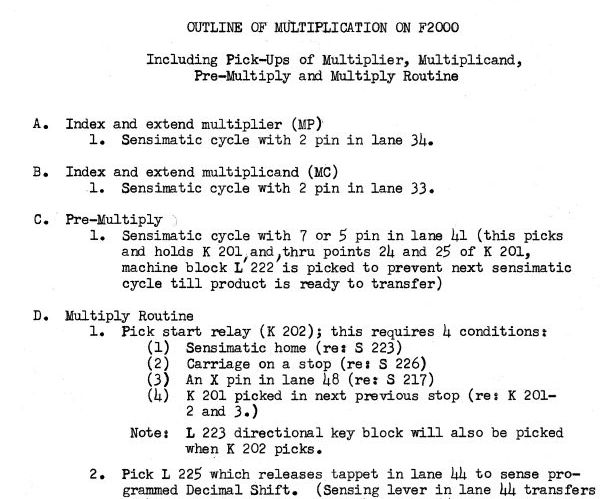 and Varityper.
and Varityper.
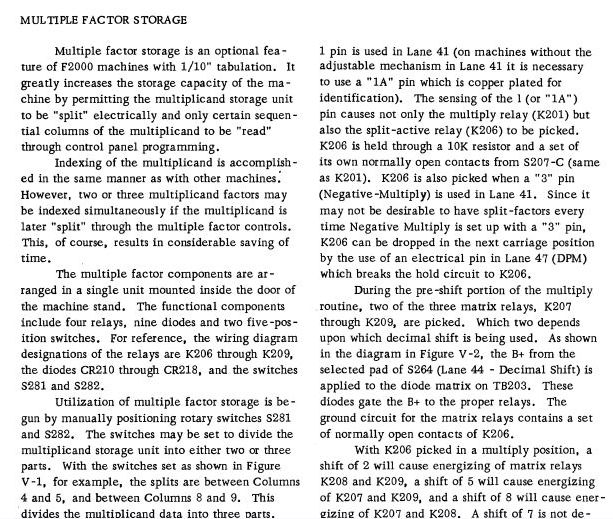 These instructions are hugely complex and detailed, but everything is in normal English, so you can read it unambiguously.
When mathematicians wrote manuals, they continued their blackboard habits of mixing Greek and Hebrew and Roman and Fraktur and made-up symbols, scrawled loosely and sloppily.
From a MANIAC III manual written at Univ of Chicago in 1962:
These instructions are hugely complex and detailed, but everything is in normal English, so you can read it unambiguously.
When mathematicians wrote manuals, they continued their blackboard habits of mixing Greek and Hebrew and Roman and Fraktur and made-up symbols, scrawled loosely and sloppily.
From a MANIAC III manual written at Univ of Chicago in 1962:

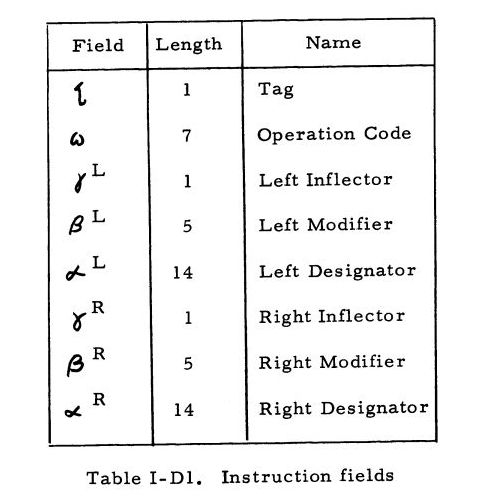 Can you tell the difference between the alpha and gamma? And what is that symbol for Tag? Is that a tau or a iota with an acute accent over it?
Can you tell the difference between the alpha and gamma? And what is that symbol for Tag? Is that a tau or a iota with an acute accent over it?
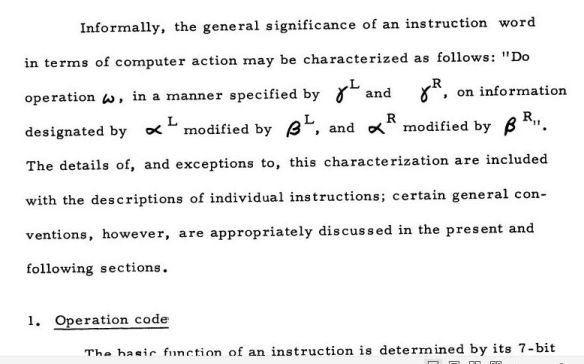 Note the beta superscripted by a capital R which is subscripted by 11, or is it [1 sub 1] or [1 in the first category and 1 in the second category]? No, it's not any of those things. It's the fucking RIGHT QUOTATION MARK for the sentence.
More to the point, they had just defined specific WORDS for their concepts. Operation, tag, information, left designator, right inflector. THEY DIDN'T NEED THE GREEK. The entire discussion would have been clearer using the ACTUAL FUCKING WORDS.
Do an Operation, in a manner specified by the left and right Inflectors, on information designated by left Designators and modified by left Modifiers; and on information designated by right Designators and modified by right Modifiers.
Even when they accidentally used only Roman letters, the blackboard habit of supersubsuperscripting continued.
Note the beta superscripted by a capital R which is subscripted by 11, or is it [1 sub 1] or [1 in the first category and 1 in the second category]? No, it's not any of those things. It's the fucking RIGHT QUOTATION MARK for the sentence.
More to the point, they had just defined specific WORDS for their concepts. Operation, tag, information, left designator, right inflector. THEY DIDN'T NEED THE GREEK. The entire discussion would have been clearer using the ACTUAL FUCKING WORDS.
Do an Operation, in a manner specified by the left and right Inflectors, on information designated by left Designators and modified by left Modifiers; and on information designated by right Designators and modified by right Modifiers.
Even when they accidentally used only Roman letters, the blackboard habit of supersubsuperscripting continued.
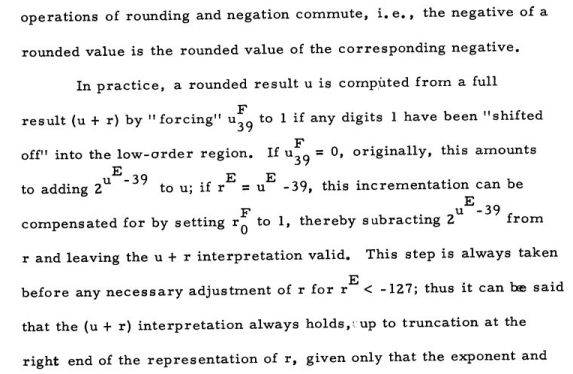 The limited character set on keypunch keyboards FORCED programmers to talk English.
The limited character set on keypunch keyboards FORCED programmers to talk English.
 No Greek, no math symbols, no subs and supers. Just uppercase Roman, numbers, and a few bookkeeping symbols like dollars and percent. COBOL was written on and for keypunches, and it originally had no symbols at all.
DIVIDE NUMA BY NUMB GIVING RES-DIV.
Naming variables in English was the biggest contribution of programming.
Later keyboards and languages made longer names possible, and introduced more symbols, but never dropped to the level of mathematicians.
Those academics at Chicago had been using computers and keypunches for several years, and still hadn't learned English. Modern mathematicians still insist on a tangled jumble of Greek, Hebrew, supersubsupersubscripts, and an occasional SINGLE letter of English. Never never never allow a word to contaminate the purity of obfuscation.
No Greek, no math symbols, no subs and supers. Just uppercase Roman, numbers, and a few bookkeeping symbols like dollars and percent. COBOL was written on and for keypunches, and it originally had no symbols at all.
DIVIDE NUMA BY NUMB GIVING RES-DIV.
Naming variables in English was the biggest contribution of programming.
Later keyboards and languages made longer names possible, and introduced more symbols, but never dropped to the level of mathematicians.
Those academics at Chicago had been using computers and keypunches for several years, and still hadn't learned English. Modern mathematicians still insist on a tangled jumble of Greek, Hebrew, supersubsupersubscripts, and an occasional SINGLE letter of English. Never never never allow a word to contaminate the purity of obfuscation.Labels: Real World Math, storage
 Blue is housing prices in Los Angeles, red is national murder rates. Sailer and Wolf placed different causes on the peaks, but in fact both are parallel results of the same policies by the same speculators.
When life gets too difficult for ordinary people, ordinary people get pissed.
Of course it's a one-way pissitude. Murders and suicides decrease the supply of poor people, but don't affect Bezos and Buffett and Bloomberg at all.
Bloomberg is the major player on the murder curve, since he owns the mayors and drives the "defund" campaigns.
The ultimate goal of the speculators is simple.
EXTERMINATE ALL UNTERMENSCHEN.
Gaining trillions of dollars from the extermination is just a pleasant side effect.
Blue is housing prices in Los Angeles, red is national murder rates. Sailer and Wolf placed different causes on the peaks, but in fact both are parallel results of the same policies by the same speculators.
When life gets too difficult for ordinary people, ordinary people get pissed.
Of course it's a one-way pissitude. Murders and suicides decrease the supply of poor people, but don't affect Bezos and Buffett and Bloomberg at all.
Bloomberg is the major player on the murder curve, since he owns the mayors and drives the "defund" campaigns.
The ultimate goal of the speculators is simple.
EXTERMINATE ALL UNTERMENSCHEN.
Gaining trillions of dollars from the extermination is just a pleasant side effect.Labels: #bluelivesmatter, 2000=1000, infinite evil
 Neofeudal one-way obligation. Bloomberg and Buffett and Bezos don't pay taxes. Unlike old-fashioned local landlords, they don't have any obligation to the renter or the city or the county.
Wolf's magnificent graphs make it clear that real estate is no longer local local local. The national median asking price is around 300k, which seems to be a strong norm.
Checking in this neighborhood, Zillow shows only two houses for sale, both around 300k. Both are familiar; I see them on my daily walks. Both are nicely kept 60s ranchers. I haven't seen any other signs, not even FSBO. Before the "virus" there were usually 10 houses for sale, with prices ranging from 80k to 240k.
= = = = =
Since 2008 the speculators have been gathering up massive numbers of houses, so the supply is rapidly approaching zero. The same speculators are in charge of the "virus", which has mysteriously and coincidentally restricted supply of all the necessary components as well. So there's no new construction to add new supply of housing.
This is a replication of the Anslinger technique. In 1938 the Federal alcohol enforcement agency was suffering from lack of Prohibition. Its head Harry Anslinger saw that repeal had made it difficult to create new problems by writing laws, so he prohibited marijuana by restricting the supply of legality. You were still perfectly free to buy and sell pot, provided you paid the tax and pasted the tax stamps on each package. But WHOOPSIE! Through some mysterious accidental oversight, ATF had never gotten around to printing any tax stamps, so you couldn't buy and sell pot.
Now you're perfectly free to buy a new house, except that there are no houses available and no chance of increasing the supply. It's not a "prohibition" or a "monopoly", it's just an accidental situation that accidentally happened as part of the natural flow of commerce. Or so they say.
Neofeudal one-way obligation. Bloomberg and Buffett and Bezos don't pay taxes. Unlike old-fashioned local landlords, they don't have any obligation to the renter or the city or the county.
Wolf's magnificent graphs make it clear that real estate is no longer local local local. The national median asking price is around 300k, which seems to be a strong norm.
Checking in this neighborhood, Zillow shows only two houses for sale, both around 300k. Both are familiar; I see them on my daily walks. Both are nicely kept 60s ranchers. I haven't seen any other signs, not even FSBO. Before the "virus" there were usually 10 houses for sale, with prices ranging from 80k to 240k.
= = = = =
Since 2008 the speculators have been gathering up massive numbers of houses, so the supply is rapidly approaching zero. The same speculators are in charge of the "virus", which has mysteriously and coincidentally restricted supply of all the necessary components as well. So there's no new construction to add new supply of housing.
This is a replication of the Anslinger technique. In 1938 the Federal alcohol enforcement agency was suffering from lack of Prohibition. Its head Harry Anslinger saw that repeal had made it difficult to create new problems by writing laws, so he prohibited marijuana by restricting the supply of legality. You were still perfectly free to buy and sell pot, provided you paid the tax and pasted the tax stamps on each package. But WHOOPSIE! Through some mysterious accidental oversight, ATF had never gotten around to printing any tax stamps, so you couldn't buy and sell pot.
Now you're perfectly free to buy a new house, except that there are no houses available and no chance of increasing the supply. It's not a "prohibition" or a "monopoly", it's just an accidental situation that accidentally happened as part of the natural flow of commerce. Or so they say.
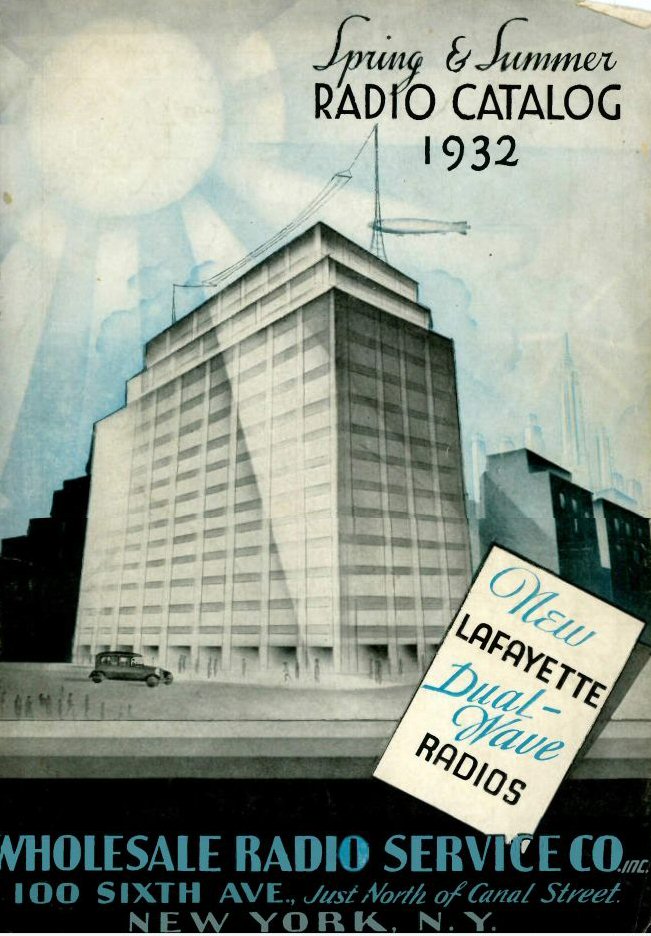 There are two separate items that might have caused trouble later if Nowism had been in charge.
There are two separate items that might have caused trouble later if Nowism had been in charge.Labels: Alternate universe
Learning from error is often a slow process. In machine learning, the learning rate depends on a loss function that specifies a cost for error. Here, we hypothesized that during motor learning, error carries an implicit cost for the brain because the act of correcting for error consumes time and energy. Thus, if this implicit cost could be increased, it may robustly alter how the brain learns from error. To vary the implicit cost of error, we designed a task that combined saccade adaptation with motion discrimination: movement errors resulted in corrective saccades, but those corrections took time away from acquiring information in the discrimination task. We then modulated error cost using coherence of the discrimination task and found that when error cost was large, pupil diameter increased and the brain learned more from error. However, when error cost was small, the pupil constricted and the brain learned less from the same error. Thus, during sensorimotor adaptation, the act of correcting for error carries an implicit cost for the brain. Modulating this cost affects how much the brain learns from error.Learning to follow dots is an unfamiliar task, and the cost was also unfamiliar. No chance of contamination from the conceptual level. In this particular experiment the distractor was a face of a pretty girl. Not a Woke image of an Individual Experiencing Non-binary Colour And Gendour. A pretty white girl. Researchers might know how to talk Wokish to get the grant, but they also know what real people really want. A more familiar task would be driving down the street and noticing a pretty girl on the sidewalk. Steering involves a complex interplay of visual and kinesthetic feedback loops. When traffic is clear, the cost of inattention is low, so we don't improve our precision. When the road is icy, the cost of inattention is high, so we focus much harder on the road and ignore the girl. Trainers have been using this technique for centuries. Learn the basics in a simple situation, then stretch and improve the learning by occasional forced failures and distractions. BUT: When high-cost and brand-new distractors of all types come at you fast and hard, there's no time for learning and no way to use textbooks or worklogs as a guide. You try to focus and try to get your job done in a minimal way. At some point you simply burn out and give up. This is how psychopaths destroy humans.
Labels: Experiential education, Jail mode, Parkinson
Labels: 2000=1000, defensible times, From rights to duties, the broken circle
 In 1957, Prescott Bush made a Senate speech recommending smaller and more economical cars. We should be more like Europe.
Romney reminded him that AMC was ALREADY MAKING such cars, so Bush didn't need to seek them elsewhere. Needless to say, Bush didn't respond.
In modern times we see this as make the rules / break the rules hypocrisy, but Romney was really saying put up or shut up.
The important variable, as fucking always, is CASTE. Rambler was LOW-STATUS, so it DIDN'T EXIST, even after it beat out Plymouth for 3rd place. Bushes are the top of the top of the top. Bushes do not recognize peasants, and Bushes do not put up or shut up when challenged by peasants.
Bushes just kill and kill and kill and kill and kill.
CASTE IS EVERYTHING. FACTS ARE NOTHING.
In 1957, Prescott Bush made a Senate speech recommending smaller and more economical cars. We should be more like Europe.
Romney reminded him that AMC was ALREADY MAKING such cars, so Bush didn't need to seek them elsewhere. Needless to say, Bush didn't respond.
In modern times we see this as make the rules / break the rules hypocrisy, but Romney was really saying put up or shut up.
The important variable, as fucking always, is CASTE. Rambler was LOW-STATUS, so it DIDN'T EXIST, even after it beat out Plymouth for 3rd place. Bushes are the top of the top of the top. Bushes do not recognize peasants, and Bushes do not put up or shut up when challenged by peasants.
Bushes just kill and kill and kill and kill and kill.
CASTE IS EVERYTHING. FACTS ARE NOTHING.Labels: 2000=1000
Labels: 2000=1000, defensible cases, defensible spaces, Equipoise
Conversely, though, the same lesson—avoid loud and dogmatic virtue-signaling—could be worth remembering for people trying to promulgate truthful information about, say, vaccines or climate change.We know what you think "truth" is, but at least you managed to avoid saying it. Practicing what you preach instead of screeching what you preach. In fact their strict objectivity may have missed an important cause.
They’re starting to understand why some of the most intense social polarization seems to be driven by relatively small cadres of highly politicized individuals who mainly talk to each other.Maybe you should ask who these small cadres are working for. I bet you'd find BOTH sides are working for Deepstate. Putting it another way, you should ask the metaquestion. Beyond all the fake noisy "sides" there are two real sides. One side wants total and eternal WAR AND CHAOS. The other side wants stability and calm. All the money and power is on the WAR side. See Machiavelli.
Labels: Alternate universe
 Bungalows had either a grade entry:
Bungalows had either a grade entry:
 or a semi-open back porch:
or a semi-open back porch:
 But these 1957 suburban houses often didn't have a back door at all. They had a side door into the attached garage, and no direct way out of the kitchen.
But these 1957 suburban houses often didn't have a back door at all. They had a side door into the attached garage, and no direct way out of the kitchen.
 Aha. The garage was meant to be a substitute for the back porch. When you came in from gardening or hanging the clothes, you'd come in through the garage, and you'd leave your shoes or dirty tools IN the garage, just as you would have left them IN the back porch or servant's hall.
Aha. The garage was meant to be a substitute for the back porch. When you came in from gardening or hanging the clothes, you'd come in through the garage, and you'd leave your shoes or dirty tools IN the garage, just as you would have left them IN the back porch or servant's hall.
 But the garage wasn't a good substitute. You had to squeeze past the big 1957 car to reach the shelves or the kitchen door. Many owners later hired contractors to open a door to the back yard directly from the utility room, which was the correct substitute.
Graphics note: This is a realistic picture. My parents bought a house like this in 1957, and their '57 Chevy filled the garage. If you parked a few inches to the left, it would block the utility room door. In this position the utility door opened, so you could get into the car, but the side door was blocked.
But the garage wasn't a good substitute. You had to squeeze past the big 1957 car to reach the shelves or the kitchen door. Many owners later hired contractors to open a door to the back yard directly from the utility room, which was the correct substitute.
Graphics note: This is a realistic picture. My parents bought a house like this in 1957, and their '57 Chevy filled the garage. If you parked a few inches to the left, it would block the utility room door. In this position the utility door opened, so you could get into the car, but the side door was blocked.
Does that mean that there is no difference between science and pseudoscience? No, it does not. Although there is no definite dividing line between day and night, we can all agree that clear examples of each are easy to find. In the same way, we can all agree that, say, physics and chemistry are clear examples of true sciences and astrology and homeopathy are excellent examples of pseudoscience. So how are we doing this? The best approach appears to be one that does not attempt to apply a definitive list of strict criteria but instead accepts that there are certain ‘benchmarks’ that characterise what we think of as good science. First and foremost, science is a set of methods for attempting to gain veridical knowledge. It is not an established body of ‘facts’ that must never be questioned. Personally, I no longer believe in paranormal phenomena such as precognition, telepathy, clairvoyance, and precognition. I could be wrong, of course, and maybe one day new evidence of a robust and replicable paranormal phenomenon will be presented that will lead me to change my mind. After almost a century and a half of systematic research, I’m not holding my breath.Getting there. Telepathy and precognition DEFINITELY happen SOMETIMES. They can't be turned on and off like an engine or a flashlight, so they can't be examined in a standard controlled experiment. A more profitable examination would treat the SOMETIMES as a skill, not a theory. What conditions are conducive to telepathy and precognition? Who seems to be most sensitive? How can we increase our sensitivity? As fucking usual, Russians were working on this SKILL for quite a while, and we were dismissing it just as we dismissed Lamarck. Russian science has a record of being right, and we have a record of being wrong. = = = = = When you start from absolute determinism, ESP and precognition aren't a problem. The old Arabs and Persians started there, and the Euros who picked up science from them (Brahe, Kepler, etc) were thinking in the same mold. The universe is a massive clock, with an infinite pattern of interfering waveforms from its parts. An observer who is sensitive to those waveforms should be able to predict the future pattern of the waveforms. Real astrology, as I've been pointing out, was an attempt to systematize those patterns, or at least the part of the patterns formed by our nearby planets. I've been circling around this question for several months. and still haven't managed to pull it together. Apparently I'm not predestined to cinch up the topic yet.
Labels: Equipoise, Not AI point-missing, skill-estate
Labels: skill-estate, storage
Scenarios have been developed to portray clusters of the selected critical uncertainties that bear on the topic of investment in climate-compatible infrastructure. Each has a core characterization and a combination of critical uncertainties. 1. Open Internationalism: emphasizes largely open markets, a powerful global corporate community, strong citizen action, and ongoing international cooperation. 2. Assertive States: emphasizes strong state influence over domestic and global economies, corporateinterests that are more responsive to policy imperatives, and long-term policy objectives that take priority over shorter-term and more immediate citizen interests. 3. Patchwork: emphasizes a global economy made up of more autonomous entities, whether states, regions and/or sub-state actors, shifting demand for infrastructure, and strengthening investment in local, more closed economies. 4. Shocked Collaboration: emphasizes the effects of major shocks to the global system, whether recessions, weather events, or security-related disruptions, resulting in more ambitious collaboration involving public and private actors.Elsewhere the document mentions that the shocks may be "exogenous or policy-driven", and again we know which is preferred. SHOCKED COLLABORATION is the only thing Deepstate wants. We see it over and over and over. 2020 was the biggest and most evil by an infinite measure, and I'm sure the next one will be even bigger and more totally holocaustal. What was the first** policy-driven Shocked Collaboration after Deepstate's lethal rebirth in 1946? Sputnik. It wasn't an exogenous shock. There was no reason for US or Russia to send men into space. 50 years later, we haven't gone back to the moon or beyond the moon, and the space race didn't improve technology at all. Zero consequences, unless you consider Tang to be worth the trillion-dollar expenditure Computing was steadily improving, and electronics was steadily miniaturizing, since 1890. Space didn't change the shape of those curves. Sputnik was a policy-driven shock that led to a #WholeOfSociety collaboration. Russia beat us, so we needed to mobilize everyone to beat them next time. Commerce picked up the theme immediately, indicating a carefully prepared Shock. From radio trade journals in Nov and Dec '57:

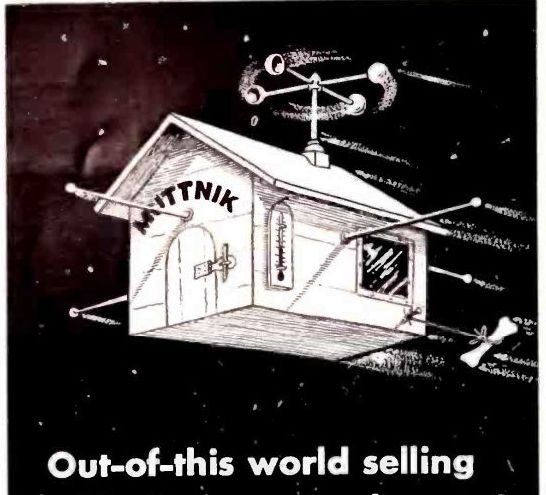

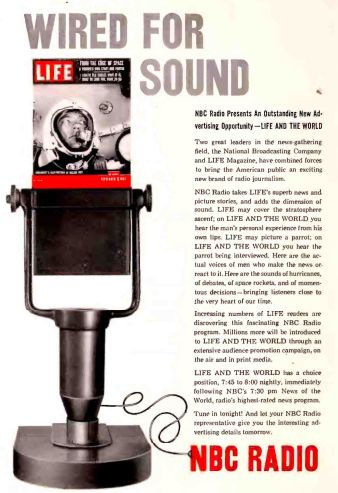 Note especially the astronaut in the last ad. The first actual man in space was four years later, and again he was Russian. Oops.
We didn't beat them the next time, because AS FUCKING USUAL we Unsolved all the problems. The Unsolving was most dramatic in education, as I've hammered hundreds of times. We abandoned useful math, switching to brain-destroying Set Theory.
= = = = =
** Fussy footnote: Korea was Deepstate's first big action after FDR died, but Korea was not a #WholeOfSociety collaboration. It was a leftover piece of WW2, operating on inertia. We had just finished defeating Japan, who had been occupying Korea since 1905. We wanted to keep things stable, but Mao threatened to undo our success. We didn't mobilize our media and culture; there was very little propaganda. The military knew the war was unwinnable, and Ike carried the day by speaking FOR the military. He promised to pull out, got elected, and pulled out. Arguably Korea marked the last time our supposed 'checks and balances' really worked.
Note especially the astronaut in the last ad. The first actual man in space was four years later, and again he was Russian. Oops.
We didn't beat them the next time, because AS FUCKING USUAL we Unsolved all the problems. The Unsolving was most dramatic in education, as I've hammered hundreds of times. We abandoned useful math, switching to brain-destroying Set Theory.
= = = = =
** Fussy footnote: Korea was Deepstate's first big action after FDR died, but Korea was not a #WholeOfSociety collaboration. It was a leftover piece of WW2, operating on inertia. We had just finished defeating Japan, who had been occupying Korea since 1905. We wanted to keep things stable, but Mao threatened to undo our success. We didn't mobilize our media and culture; there was very little propaganda. The military knew the war was unwinnable, and Ike carried the day by speaking FOR the military. He promised to pull out, got elected, and pulled out. Arguably Korea marked the last time our supposed 'checks and balances' really worked.Labels: #WholeOfSociety, Carbon Cult
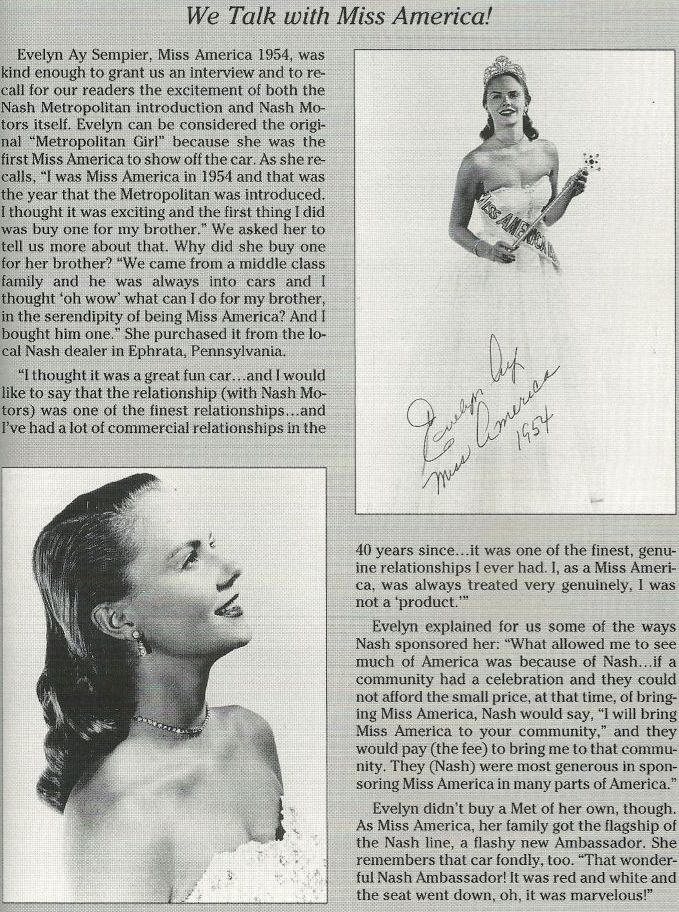 Transcribing the corporate part:
Transcribing the corporate part:
The relationship with Nash Motors was one of the finest relationships, and I've had a lot of commercial relationships in the 40 years since. I, as Miss America, was always treated very genuinely. I was not a 'product'. What allowed me to see much of America [she traveled 270,000 miles in that year] was Nash. If a community had a celebration and they could not afford the small price of bringing Miss America, Nash would say 'I will bring MIss America to your community', and they would pay the fee.I was not a product. Good companies recognized the difference back then. Cars and cans were products. Customers and employees were people. People are different. People have genes and souls. Small towns were also important enough and distinct enough to be worth paying for an appearance. Now we're all products. We're all fungible. We're all mass-produced and constantly inspected by online QC. We're instantly rejected if not 100.0000% compliant with all EPA and NSA and ISO and above all CDC standards. Footnote: Gracious and generous Evelyn is the exact opposite of another celebrity who was involved in Nash promotion at the same time. Baseball star Ted Williams received a sporty prototype of the Metro as part of a peculiarly misdirected contest. He hated the car and SOLD it to another rich asshole. Ted's arrogance was properly rewarded in an appropriately peculiar afterlife.
Labels: Alternate universe, Equipoise, skill-estate
Labels: #WholeOfSociety, Constants and Variables, Jackboot stomping forever, UNENDING HELL
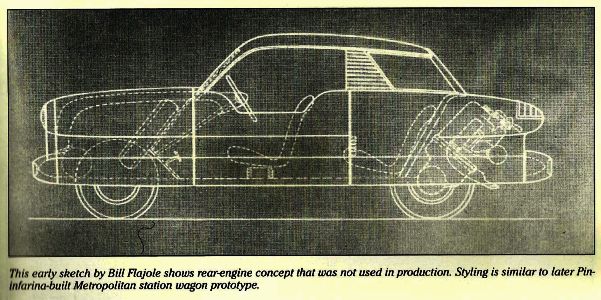 This idea would have used a water-cooled boxer six, oddly tilted. The angle would have introduced a slew of unnecessary problems, and you can see from the diagram that the tilt wasn't needed anyway. The engine would have fitted horizontally without stretching the body.
Though the configuration was dumb, the engine itself was well developed and compact:
This idea would have used a water-cooled boxer six, oddly tilted. The angle would have introduced a slew of unnecessary problems, and you can see from the diagram that the tilt wasn't needed anyway. The engine would have fitted horizontally without stretching the body.
Though the configuration was dumb, the engine itself was well developed and compact:
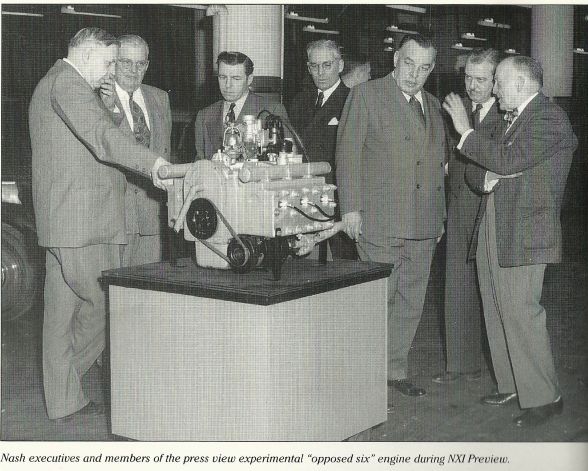 It appears to have the typical Nash manifold-less exhaust. Interesting expressions on the unidentified men. Puzzled but trying to act confident. All of them are 'looking askance' at the engine.
Why atypical? George Mason had a nearly perfect sense of direction. He deeply understood the Booker T rule. Stick to your niche, maintain your niche, develop your skills to the max, amortize to the max, don't waste energy on speculation.
Thus it's surprising that Nash didn't try to reuse and amortize this engine. It was too powerful for the Metro, and wasn't needed in the standardized Ramblers.
Where would it belong perfectly? PACER.
It appears to have the typical Nash manifold-less exhaust. Interesting expressions on the unidentified men. Puzzled but trying to act confident. All of them are 'looking askance' at the engine.
Why atypical? George Mason had a nearly perfect sense of direction. He deeply understood the Booker T rule. Stick to your niche, maintain your niche, develop your skills to the max, amortize to the max, don't waste energy on speculation.
Thus it's surprising that Nash didn't try to reuse and amortize this engine. It was too powerful for the Metro, and wasn't needed in the standardized Ramblers.
Where would it belong perfectly? PACER.
Labels: Alternate universe
“The control our search engines have over us is very sneaky,” says Nathan Jacobson, web developer and designer at the Discovery Institute. “It’s not obvious. When you go to The New York Times, you know the editors have chosen a certain set of subjects to cover, articles to share, they’ve selected certain writers to employ, so it’s kind of understood that you’re getting an intentional experience. The information that’s being fed to you is not all the information. It’s a carefully selected subset of information.” In other words, the common assumption is that Google is a neutral library of information when in reality, it’s just as much a curator of information as The New York Times.No. Libraries are NOT neutral. Librarians have the same mindset as Google and NYTimes. This is FEROCIOUSLY OBVIOUS on the reading end, and I've seen it on the writing end as well. In 1998 I was a regular customer at the downtown library. They knew me. After publishing my first courseware, I proudly donated a copy of the college textbook to the library. The librarian treated it like a dead mouse. She snooted her head upward, gave me the standard aristocratic veiled eyes and imperceptible headshake, picked up the textbook at extreme arm's length, and said "This will go into our annual book sale." Didn't even bother to pretend that it was suitable for the shelves. Google is actually MORE neutral than libraries. It does include content from unfashionable sources, whether it prioritizes them or not. You're reading the proof. I've been writing this blog for 16 years on a Google-based platform. I'm unfashionable on all topics. Google has never censored what I write. = = = = = Second pointmiss:
Enter new search engine competitor, Brave Search. Unlike the other search engine alternatives that pull from the same English language indexes created by Google and Bing, Brave Search runs off of its own index, the third in existence in the English-speaking world. Google remains dominant for now. Brave Search is hardly as well-known as Google and will need to do some work in the public awareness arena. Additionally, Google remains the better engine to use when it comes to niche searches. Nevertheless, Brave Search is already a strong alternative and expected to grow stronger.Eich is totally missing the Booker T rule. When you're the small low-status competitor, you have to FIND A NICHE AND STICK TO IT. You're NOT going to beat Google at its own game. You're NOT going to be the first choice for people who want the latest celebrity crap and partisan political crap. Eich is making the Abernethy error, losing the ACHIEVABLE niches to aim for the IMPOSSIBLE mainstream. = = = = = Third pointmiss: Eich's Brave browser advertises privacy, allegedly protecting your account from data robbery or whatever. This is a fake concern in the first fucking place. Privacy is impossible. One browser is allegedly protecting your data while everything else is not protecting you. Closing one window doesn't help when all the other windows and doors are stuck open. So how will the Brave search engine protect your privacy?
Jacobson explains that, building on its acquisition of Tailcat, Brave Search is “anonymously leveraging users’ computers to crawl the web and contribute to its index.” Maintaining an index of the web is a “massive undertaking” considering how much new content is posted online every twenty-four hours.Jesus! Brave will protect your privacy by invading your computer and turning it into a bot. Maybe I'm old-fashioned, but I thought the purpose of AV was to PREVENT malware from turning your computer into a bot. (Incidentally, this fits into the War On X theme. The War On Hackers makes more hacking, not less hacking.) = = = = = Emersonian footnote: After linking the Library Association website to reference their obvious mindset, I skimmed the website. They're focusing heavily on e-learning now, because e-learning enables them to keep ALL ORANGE WITCH-BREATH DEPLORABLES out of their lives. Too bad, nasty vile arrogant haughty bigoted bitch. You tossed out one of the FIRST examples of user-friendly courseware. The 1998 dead mouse turned out to be your Lord and Savior in 2020, because it was rebranded by your fellow demons. Caste is everything. Content is nothing.
Labels: AI point-missing, Emersonian justice
 Circuses used Bantams as clown cars, and amusement parks turned Metros into rides:
Circuses used Bantams as clown cars, and amusement parks turned Metros into rides:
 Newspapers and other businesses also enjoyed Bantams and Metros for city delivery of small items. Businesses understood that the Metro was a miniature business coupe. No back seat, trunk area lockable and accessible from inside. Its size made it an ideal replacement for motorcycles in dispatch and messenger service. Carry a reporter or a report. It couldn't quite fit in the same small space as a motorcycle, but it was much safer and comfier in rain and snow, and the storage area was secure.
Nash could have done more to attract the business coupe market. Austin made bucket seats for its domestic Austin and Morris cars, so the Metro could have offered a bucket option cheaply. The business user could remove the right seat for more storage area and access, similar to panel trucks and vans. Fans of "sporty Euro" cars would also appreciate the buckets.
Emphasizing business use would also enable a more appropriate name. Metropolitan was certainly a better name than Mason's original choice, NKI for Nash-Kelvinator International. But it didn't fit with Ambassador and Statesman. Courier would suggest the business purpose and match the other names.
Nash also tried to appeal to police departments. The Metro had one unique advantage for parking patrol. Because it was built in England for sale in both countries, RHD editions were available at no extra cost.
Newspapers and other businesses also enjoyed Bantams and Metros for city delivery of small items. Businesses understood that the Metro was a miniature business coupe. No back seat, trunk area lockable and accessible from inside. Its size made it an ideal replacement for motorcycles in dispatch and messenger service. Carry a reporter or a report. It couldn't quite fit in the same small space as a motorcycle, but it was much safer and comfier in rain and snow, and the storage area was secure.
Nash could have done more to attract the business coupe market. Austin made bucket seats for its domestic Austin and Morris cars, so the Metro could have offered a bucket option cheaply. The business user could remove the right seat for more storage area and access, similar to panel trucks and vans. Fans of "sporty Euro" cars would also appreciate the buckets.
Emphasizing business use would also enable a more appropriate name. Metropolitan was certainly a better name than Mason's original choice, NKI for Nash-Kelvinator International. But it didn't fit with Ambassador and Statesman. Courier would suggest the business purpose and match the other names.
Nash also tried to appeal to police departments. The Metro had one unique advantage for parking patrol. Because it was built in England for sale in both countries, RHD editions were available at no extra cost.

 Very few cities responded, and surprisingly Kenosha WASN'T among them. Normally the police would only buy an offbeat car to support local industries. Cops preferred Fords for good reasons.
Very few cities responded, and surprisingly Kenosha WASN'T among them. Normally the police would only buy an offbeat car to support local industries. Cops preferred Fords for good reasons.
 Hmm. Is that the same '56 Chevy in both pictures?
Hmm. Is that the same '56 Chevy in both pictures?Labels: Entertainment
As shocking as it may sound to modern ears, these ties have something of a feudal nature. The historically misunderstood feudal bond consisted of mutual ties that bound people together in friendship and service. It was a flexible and creative bond inside a family-like relationship where each party agreed to be at the disposition of the other—even risking life if necessary. Unlike the cold bureaucratic relationships that bind people today to abstract corporate and governmental structures, the feudal bond was extremely personal. Each party seriously assumed duties and responsibilities to the other and saw it as a sacred duty.Starting in 1700, London and NYC financiers ripped these bonds asunder, and simultaneously turned the definitions and stories upside down. All propaganda and all written history since then has told us that feudal bonds were "slavery", which was uniformly horrible for the slave and wonderful for the owner. The same propaganda instructs us that impersonal NON-CONTRACTUAL relationships give freedom to the employee. Madman Lincoln was acting for those financiers, who had prepared the ground for his holocaust by sending bands of ascetic RELIGIOUS activists to spread sweatshops in the West. Outside of agrarian serfdom there were other commercial bonds, equally strong and bilateral. Apprentices were BOUND to the masters for 7 years. Some bad masters exploited the apprentices in the same way that a wage-paying capitalist exploits his "free" employees. But other masters recognized the talents and skills of their apprentices, and sacrificed profit to develop the skills. The latter story shows up repeatedly in the biographies of inventors and scientists and leaders, from Carver to James Ferguson.
Labels: 2000=1000, Carver, Equipoise, the broken circle
Our friend Brian Keating, the world-renowned physicist at UC San Diego, interviewed Ben Shapiro for Dr. Keating’s podcast, “Into the Impossible.” Shapiro introduces a new and helpful word — or at least a word that was new to me — “ultracrepidarianism.” It means “noting or pertaining to a person who criticizes, judges, or gives advice outside the area of his or her expertise.” This is essentially the larger category of error to which a more familiar word, scientism, belongs. Scientism is what happens when scientists (or doctors, one might add) “give advice outside their area of expertise.” It’s an invitation to authoritarianism, trampling democracy because Science (or Whatever) Says, which is why Shapiro brings it up.No, experts are NOT talking about subjects they don't know. EXPERTS ARE MISUSING THEIR KNOWLEDGE TO GIVE INTENTIONALLY WRONG ADVICE. Fauci is a real expert. Before 2020 he was giving correct advice, following real medicine and real public health. In March 2020 he flipped the entire profession backwards. All of the CDC/Fauci advice is PRECISELY WRONG by the standards of medicine. The underlying pattern is our perpetual and endless WarOns. Parkinson tells us that bureaucracies create and maintain problems. An ever-increasing problem means an ever-increasing budget. An ended war or a solved problem means that the budget must be cut or the agency deleted. 1920 gave us the War On Alcohol, which created more alcohol and more drunkards. 1950 gave us the War On Commies, which created more commies by direct FBI action and by rebellion. 1965 brought the War On Poverty, which slammed urban blacks down from their relative prosperity and highly skilled jobs into helpless poverty. 1975 started the War On Carbon, which has given us more coal power and more floods and more air pollution. 1980 brought the War On Drugs (after an earlier half-start in the '60s.) The War On Drugs distributed crack in the ghettoes and oxycontin in Appalachia. 2001, of course, was the War On Islamic Terror, with CIA and FBI working together to turn alienated Muslims into "terrorists". And now we have the War On Virus, which takes every conceivable step to eliminate immunity and maintain an epidemic forever. Simple rule: War On X makes more X. In each of these WarOns, real experts were bribed or blackmailed into using their expertise AGAINST their normal goals. In our foreign WarOns in Iraq and Afghanistan, the military carefully avoids taking any steps that could end the war. A nonexpert might accidentally cause peace. In the War On Virus, Public Health Demons know everything about viruses and immunity, and use their expert knowledge to STOP immunity and maintain the virus forever. Shapiro thinks that experts are acting outside of their knowledge. NO. When you are giving INEXPERT advice, you might accidentally solve a problem by common sense and intuition. Only a true expert knows how to UNSOLVE a problem or UNCURE a disease. = = = = = Later: If guilds still functioned properly, WarOns would be harder to accomplish. These experts are BETRAYING their guild, CORRUPTING the intellectual property of the guild, DESTROYING the value of the painfully developed skills and talents of the guild. Soldiers are supposed to win a winnable war, not design and implement an unwinnable war. Scientists are supposed to solve problems, not UNsolve problems. Doctors are supposed to cure diseases, not UNcure diseases. Police are supposed to ARREST gangsters, not AID gangsters. In each case we have turned the definition backwards. We now say that a cop who arrests criminals is betraying his badge. We say that a doctor who tries to arrest a virus with Ivermectin instead of aiding the virus with muzzles and lockdowns is betraying medicine. We say that a soldier who refuses to fight a pointless unwinnable war is deserting.
Labels: Parkinson, skill-estate, UNENDING HELL
 Each user is encased in a private anechoic chamber. You think you're talking to your friends of the same side, but in fact you're not emitting or receiving any actual information.
Each user is encased in a private anechoic chamber. You think you're talking to your friends of the same side, but in fact you're not emitting or receiving any actual information.
 Only the monitors at GoogleAppleNSA are listening.
Only the monitors at GoogleAppleNSA are listening.
Labels: #WholeOfSociety
To set a tone of purpose and concern for the days that would follow, the opening keynote address was delivered by author/inventor, Buckminster Fuller, who spoke for two hours and 15 minutes about the "dynamics of mass communication in relation to expanding world technology." Fuller urged those present to consider how insignificant the human being is in relation to the universe. Fuller observed great growing concern over the crisis of energy but stated that, "the concern should be for the apparent crisis of ignorance." I later realized how right Fuller was when I asked about 35 people at random what they thought of Fuller's speech. Some of the comments I received were: "he's really heavy," "his speech was a bit heavy for 9 o'clock in the morning." "the old guy is really sharp," and "he really didn't say anything about radio or records."No, Bucky wasn't right. Anyone who complains about IGNORANCE is automatically wrong. The commenters were right. Bucky was heavvvvyyyyy in the 70s sense, a shitpile of big words with little meaning. The last commenter recognized that Bucky wasn't talking about anything at all, just bullshitting as usual. All of Bucky's "inventions" are equally bullshit. Just plain DUMB. = = = = = And then the inimitable McLuhan.
We entered Barry's large sterile living room and for the first time that evening I saw Dr McLuhan without his coat...Even while he had napped at home he had kept it on...Now he seemed to change...to relax more...He literally fell down on the couch in slouch...and began to rap...For some unknown reason his subject began... MARSHALL: Ahhh...There we go...Somebody said..."Farting is such sweet sorrow...You might be amused to know that the word "fart" means go...It's the past participle of the word "faron "...which means..."to go"...to fare...forward...to fare...and "faron" to go...is the past participle of fahrt (German) meaning gone...and when you're "gone"...or "fahrted" why the people say in England..."and joy go with thee"...instead of saying..."Gesunheidt" they say..."and joy go. with thee"...But, Chaucer built his great poem The House of Fame...or..."The House of Fame"...It's a theory of what human reputation of fame is...He built the entire poem on the metaphor of "fart "...because he says "Fame is just air broken and broken air "...Here's your resonant interval again...And broken air creates the noise of sound...And then there's reputation...or fame...And fame is just a collosal fart...So he built a learned poem using all the physics of the Middle Age entirely on the pun... "As Fame As F a r t "... T h e G r e a t Chaucer..." "Incredible"...I said, trying to figure out just what great wisdom he had bestowed upon me...No wisdom at all. Pure bullshit. Schizophrenic rambling. Fart doesn't come from fahren, it's an old word that goes all the way back to Indo-European, and always meant a gaseous emission from an asshole. McLuhan's famous "philosophy" about media was equally transparent bullshit. This connects nicely with previous item about the condensation and fortification of radio. Radio and text are condensed. They present an outline or framework that invites you to create your own universe, to exercise your own mind. Television and movies are the opposite. They inject a pre-cooked universe, leaving no room for your own imagination. McLuhan had it EXACTLY FUCKING BACKWARDS. He claimed that TV was cool, which meant that it passively invited you to fill in your own images, while text and radio were hot, actively providing the full package. This is OBVIOUSLY AND BLATANTLY AND TRANSPARENTLY WRONG. You don't need to know ANY FUCKING THING about neurology or printing or modulation or cathode-ray tubes. Anyone who has experienced all three types of media KNOWS how each type works. Both of these assholes were basically cult leaders. They had more in common with Charlie Manson than with any actual inventors or philosophers.
Labels: NOT alternate universe, Sucker Filter
 The interactive radio show Calling All Detectives was also condensed, with the same qualities as Campbell's. Each episode on the transcription disk (the can) is just 8 minutes long, but the writers packed in enough solid material to make it feel like a half hour of story. No unnecessary banter, no long pauses, no music. As always with radio, the listener supplies the water, filling in the visual aspect of locations and characters. This show was uniquely fortified by local announcers (chefs) who added an interactive quiz with a substantial reward. Because the quiz was based on a detail in the episode, the fortification boosted the attentional (nutritional) value of the show itself.
This episode is about a restaurant with no customers. The detective investigates what seems to be a gang front, and finds instead that the owner is renting out the kitchen to amateur cooks so they can practice and enjoy in a fancy kitchen.
At the end the narrator says:
Man can't live by bread alone; but if it's bread he makes himself, he's willing to try.
Or as I'm fond of saying,
A MAN NEEDS TO MAKE THINGS. IF HE CAN'T MAKE THINGS, HE WILL BREAK THINGS.
The interactive radio show Calling All Detectives was also condensed, with the same qualities as Campbell's. Each episode on the transcription disk (the can) is just 8 minutes long, but the writers packed in enough solid material to make it feel like a half hour of story. No unnecessary banter, no long pauses, no music. As always with radio, the listener supplies the water, filling in the visual aspect of locations and characters. This show was uniquely fortified by local announcers (chefs) who added an interactive quiz with a substantial reward. Because the quiz was based on a detail in the episode, the fortification boosted the attentional (nutritional) value of the show itself.
This episode is about a restaurant with no customers. The detective investigates what seems to be a gang front, and finds instead that the owner is renting out the kitchen to amateur cooks so they can practice and enjoy in a fancy kitchen.
At the end the narrator says:
Man can't live by bread alone; but if it's bread he makes himself, he's willing to try.
Or as I'm fond of saying,
A MAN NEEDS TO MAKE THINGS. IF HE CAN'T MAKE THINGS, HE WILL BREAK THINGS.
Labels: skill-estate, UNENDING HELL
Labels: Sorosia
Labels: Constants and Variables, coot-proofing
 Wrong!
Surprising fact: When you need to transfer a REALLY BIG batch of data, it's still easier to do it physically. Big databases or raw unedited video can run into the petabyte range. No matter how good your web connection, it's faster to let FedEx fly the entire set of disks. Amazon has a special product for this purpose, a memory box designed for freight handling.
I hadn't really thought about the question of scale, just ass-u-me-d that big corporations had special web connections. They do, but no web connection can beat a box of memory cards when the box is big enough.
It comes down to the oldest dividing line in communication. Parallel vs serial. A box of cards is parallel. A data wire is serial. Parallel is always faster.
Data communication STARTED as parallel. The Chappe semaphore system was beautifully designed to carry blocks of semantic data as a visual image. It had 256 available positions, most of which were assigned to words and phrases. Later versions even had a code-switch character, denoting that this message will use the Government phrase set or the Stock Exchange phrase set, etc.
Wrong!
Surprising fact: When you need to transfer a REALLY BIG batch of data, it's still easier to do it physically. Big databases or raw unedited video can run into the petabyte range. No matter how good your web connection, it's faster to let FedEx fly the entire set of disks. Amazon has a special product for this purpose, a memory box designed for freight handling.
I hadn't really thought about the question of scale, just ass-u-me-d that big corporations had special web connections. They do, but no web connection can beat a box of memory cards when the box is big enough.
It comes down to the oldest dividing line in communication. Parallel vs serial. A box of cards is parallel. A data wire is serial. Parallel is always faster.
Data communication STARTED as parallel. The Chappe semaphore system was beautifully designed to carry blocks of semantic data as a visual image. It had 256 available positions, most of which were assigned to words and phrases. Later versions even had a code-switch character, denoting that this message will use the Government phrase set or the Stock Exchange phrase set, etc.
 Wheatstone's early telegraphs were parallel in the modern sense, with five wires carrying a range of 32 characters.
Wheatstone's early telegraphs were parallel in the modern sense, with five wires carrying a range of 32 characters.
 Morse introduced serial communication, which became the norm for obvious practical reasons. One wire is cheaper to mount and maintain than five wires.
IBM offered web connectors in 1957, using either telegraph** or telephone wires. They transferred about 500 characters per minute.
What was the dividing line in 1957? Let's say you needed to transfer the text of a novel from your office in Chicago to your office in NYC. 100k words = 500k characters, so it would take 1000 minutes or 16 hours. Sending a typed manuscript, or a stack of cards, by truck would take about 20 hours, and a flight would take about 4 hours. So the flight would have been much faster than the web. If you needed to transfer two of those novels or data sets, even the truck would be faster.
Obviously distance is the crucial variable. Between offices in the same city, driving will almost always be faster than any kind of electronic transfer. For a longer distance, the threshold in 1957 was around one megabyte. Now it's around one petabyte, but it's still a threshold.
** "Telegraph" in 1957 was really teletype, using FSK Baudot audio. The direct ancestor of later web modems.
Morse introduced serial communication, which became the norm for obvious practical reasons. One wire is cheaper to mount and maintain than five wires.
IBM offered web connectors in 1957, using either telegraph** or telephone wires. They transferred about 500 characters per minute.
What was the dividing line in 1957? Let's say you needed to transfer the text of a novel from your office in Chicago to your office in NYC. 100k words = 500k characters, so it would take 1000 minutes or 16 hours. Sending a typed manuscript, or a stack of cards, by truck would take about 20 hours, and a flight would take about 4 hours. So the flight would have been much faster than the web. If you needed to transfer two of those novels or data sets, even the truck would be faster.
Obviously distance is the crucial variable. Between offices in the same city, driving will almost always be faster than any kind of electronic transfer. For a longer distance, the threshold in 1957 was around one megabyte. Now it's around one petabyte, but it's still a threshold.
** "Telegraph" in 1957 was really teletype, using FSK Baudot audio. The direct ancestor of later web modems.Labels: Morsenet of Things, NOT alternate universe
Unfortunately, anyone who dares take on the broken and corrupt political and media complex is teed up for absolute destruction. As lesser men cower in the face of the risk, the cost of standing up to the system becomes steeper and steeper. While you will not be locked up for saying the truth, yet, you will be demonized, stigmatized, deplatformed. You may lose your job. ... We must also guard against mindless hopefulness. Hope is a virtue, but it can be a bit of a vice if it’s an unwarranted faith that everything will work out in this world or for this country.They're starting to grasp Medieval Mode. GUTS is the only thing that counts, but GUTS must be applied sneakily and cautiously. Don't waste time on the fake solutions provided by the fake system. Survival comes first. Protest accomplishes exactly nothing. Martyrdom accomplishes exactly nothing. Your imprisonment and death will be ignored. You'll just be dead. Reprint from a few months ago: = = = = = START REPRINT: Meritocracy is part of the underlying structure that made the current tyranny possible. Cultures based on fate and luck have been less susceptible to the Share Value tech tyranny, and now less susceptible to the "medical" version. When you believe that success depends entirely on what you do, tyrants can make you guilty for not "doing as you're told". When you understand that success is mostly due to permanent caste, and when you understand that health is mostly due to the permanent qualities of your immune system, this type of guilt doesn't work. African and Oriental and Slavic countries are more fate-based. They understand the primacy of luck. They haven't taken part in the skill destruction of recent decades, and now are less harsh with lockdowns. Cultures with permanent stable castes and niches are HAPPY and CALM cultures. Meritocracy plus Darwin makes eugenics possible. The super-rich are good. Poor people have chosen to be poor, so they deserve to be punished for their crime. Culled from the herd. Meritocracy in the hands of Deepstate intentionally stirs up both sides. Rich and popular people are encouraged to believe that they got there entirely by effort, so their advantage is deserved. Unlucky people are encouraged to believe that they CAN become rich and popular, so they waste their lives in upward-striving failure instead of finding satisfaction in an appropriate niche. The inevitable and INTENDED result of this failed striving is revolution, which is the quickest way to self-cull. Revenge can't possibly work when the state holds all the cards and all the communication channels. Revenge and justice in fictional form are cathartic. Leave it there. Don't fall for the pressure. Get into medieval mode. Try to keep the monsters calm. Bored monsters eventually move on to something more interesting. There's very little support for the medieval mode, and no empathy for the unlucky in modern media. So it's especially hard to stay in this mode, but it's the best way to preserve what little remains of civilization until the monsters get tired of burning us and start burning each other. = = = = = END REPRINT.
Labels: 2000=1000, From rights to duties
"The essence of mind is design and purpose. There are some who deny that there is any design or purpose in the universe at all: but how can that be maintained when humanity itself possesses these attributes? Is it not more reasonable to say that just as we are conscious of the power of guidance in ourselves, so guidance and intelligent control may be an element running through the universe, and may be incorporated even in material things? If we could grasp the entire scheme of things, so far from wishing to shatter it to bits and then remold it nearer to the heart's desire, we should hail it as better and more satisfying than any of our random imaginings.Today a 1925 essay on science has appeared at American Radio History.
It is devoutly to be hoped that in the long run, when present international troubles have subsided, the power of rapid communication will surely conduce to better understanding among the nations, and will lead in due time to the much-desired but long-delayed era of universal peace. To this end much more than physical and material progress must contribute, for nothing can replace the whole-hearted desire for cooperative advancement of all nations on terms of mutual amity and good will. The interchange of discoveries between the nations has long been in operation. All scientific discoverers throughout the world virtually pool their resources and communicate to each other their results, except indeed those of a destructive and inhuman character. Secrecy is alien to the spirit of science; and all true wealth increases in value when freely shared. Indeed, that is the test of true wealth, as Ruskin long ago pointed out — namely, that the more it is shared the more it is possessed and the greater value it has for everybody. Witness the broadcast distribution of music and drama and works of art generally. These are not things for private possession only, but can be shared and enjoyed by all. Things of this sort constitute the true wealth of humanity, and to that category scientific discoveries belong. The spirit of nationalism is wholesome enough if it be held reasonably and without flaunting claims to superiority. The spirit of emulation is also wholesome, for it is by no means the same as competition. Emulation is the desire to do something better than has been done before, and better than others have as yet learnt to do it; while competition is mainly the effort to monopolize some activity, and to do things instead of others. In extreme cases unfair competition may prevent others from taking their due share in the beneficent work of the world. Hence progress surely lies in the direction of co-operation all round, each nation and each individual doing his best, and not seeking to prevent others from doing theirs. Nations which interchange scientific discoveries might also wisely interchange commodities, since not every locality is equally suitable for producing everything. Division of labour, of this sane and salutary kind, might be recognized as good. And international jealousies, based on mere rivalry and competition, ought to cease, especially rivalry and competition in armaments and instruments of destruction. Civilization ought to have progressed too far by now for the perversion of ingenuity responsible for the construction of diabolical and otherwise useless mechanism, and for the artificial increase of those natural evils among which it is our lot to live and against which it is our business to contend. Sorrow and sighing there must be in plenty during this planetary existence, without our trying to increase their sum, without adding to each other's difficulties, and without bringing about those horrors of death and torture and destruction which, when they occur by inadvertence or by accident or by the unconscious and uncontrolled forces of Nature, arouse worldwide feelings of sympathy and desire to help. Until the will of man is brought into harmony with what we can gather of Divine intention, humanity cannot be called really and effectively civilized, although it may achieve marvellous feats of locomotion, and although it has extended the range of human speech to distances undreamt of by our ancestors. Now that we are able to travel farther and faster, we should travel to some good purpose. And now that we can speak across a continent, let us see to it that we have something worthy to say.The overall spirit is the same from 1906 to 1925. It also sounds a lot like Harding and Hartness in the same period. Important people had ACTUALLY LEARNED from both WW1 and the excesses of the Gilded Age. The latter learning quickly disappeared in US, as Coolidge reactivated the Gilded Age based on Share Value. FDR finally brought both sides of the lesson into harmony. The WW1 learning persisted even through WW2, as we clearly recognized the difference between imperialism and defense. Deepstate had to work hard in 1946 to break down the WW1 lesson and resume imperialism.
Labels: Equipoise, Natural law = Sharia law
Labels: #WholeOfSociety
 Part of the text:
Part of the text:
ONE YEAR after issuance of the FCC's Blue Book, NAB President Justin Miller rededicated NAB and the industry to the "no compromise" campaign to stop Commission inroads on freedom of speech through regulatory trickery. Recalling FCC actions during the year in the programming field, with results amounting to illegal censorship. Judge Miller declared that the freedom of speech issue constitutes the most important problem facing broadcasters today. Nailing down NAB's forceful stand against regulatory devices striking at the heart of the American system of broadcasting, he added: "Statements I made at the time of issuance of the Blue Book still stand without qualification or compromise." He reiterated his belief that FCC encroachments on freedom of speech which are based on occasional examples of poor judgment or bad taste amount "to bold steps toward Government domination which may eventually deprive us of fundamental rights." The Freedom of Speech Committee is engaged in the task of compiling statements by associations and organizations dealing with the subject. The project will require considerable time. Meanwhile the committee will resume contacts with the newspaper and motion picture industries. The three industries pledged themselves to wage a united campaign in the interest of free speech during a meeting at the NAB convention in Chicago last October.Note that radio and newspapers and movies were working together to slow down the government's invasive attack. This was bipartisan, since Hollywood was always pure D, local radio and small papers were R, and network radio and big papers were D. The Blue Book itself was mild by modern standards. FCC had always required a certain amount of public service and education, and broadcasters had responded willingly and constructively. The Blue Book advanced into the realm of second-by-second microregulation. FCC wanted to specify exactly when a commercial could be placed in each type of program, and gave dozens of examples of 'unsatisfactory' or 'irritating' commercials. Judging by a couple of later historical articles, the united and PERSISTENT effort succeeded. FCC backed away from the microregulations. Good old 1946. The moment when Deepstate rose from its bloody grave, reasserted the authority that FDR had constrained, and began to destroy the #WholeOfSociety. Some parts of the attack were slow, and some failed. The FCC's part failed because the entire industry WORKED TOGETHER.
Labels: #WholeOfSociety
 = = = = = START REPRINT:
Here's a simple animation of Hollerith's 1890 Census machine. [Polistra and Happystar wanted to get in the picture, but they blocked the view of the important parts. So you'll have to imagine a person operating the press and moving the cards.]
= = = = = START REPRINT:
Here's a simple animation of Hollerith's 1890 Census machine. [Polistra and Happystar wanted to get in the picture, but they blocked the view of the important parts. So you'll have to imagine a person operating the press and moving the cards.]
 This 1890 Tabulator only automated the most tiresome and error-prone stage of the process, counting the holes and sorting cards into 'pre-programmed' categories. When you pull the handle of the press, a grid of spring-mounted needles tries to poke through all the hole locations. Where a hole is actually punched, the needle drops through to make contact below, closing a circuit that leads to the corresponding dial above. An electromagnet ratchets the Ones dial forward one step, and the Tens dial follows by reduction gearing. Much like the escapement in a clock.
This 1890 Tabulator only automated the most tiresome and error-prone stage of the process, counting the holes and sorting cards into 'pre-programmed' categories. When you pull the handle of the press, a grid of spring-mounted needles tries to poke through all the hole locations. Where a hole is actually punched, the needle drops through to make contact below, closing a circuit that leads to the corresponding dial above. An electromagnet ratchets the Ones dial forward one step, and the Tens dial follows by reduction gearing. Much like the escapement in a clock.
 If this particular combination of holes corresponds to one of the programmed combinations, the Sorter pops an appropriate door open. You'd then take the card, drop it into the one open door, and close the door.
The programming of combinations was done mainly by soldering and unsoldering dozens of wires for each setup! There were a few switchboard-style plugin choices, which would have been like user-selected variables, not like actual software. So my animation is arbitrary, not trying to make any real combinations, showing only that the dials increment and a different door opens for each card.
This process was clearly too 'manual' even by the standards of the time, with humans performing several steps that were easily mechanized.
After 1890 Hollerith went commercial and quickly developed various ways to feed and read cards automatically, then carry them into appropriate slots. He also began to add more calculation and programming abilities.
= = = = = END REPRINT.
Now let's look at those later versions. Here Polistra is loading a stack of cards into the most basic 1957 sorter, the model 82.
If this particular combination of holes corresponds to one of the programmed combinations, the Sorter pops an appropriate door open. You'd then take the card, drop it into the one open door, and close the door.
The programming of combinations was done mainly by soldering and unsoldering dozens of wires for each setup! There were a few switchboard-style plugin choices, which would have been like user-selected variables, not like actual software. So my animation is arbitrary, not trying to make any real combinations, showing only that the dials increment and a different door opens for each card.
This process was clearly too 'manual' even by the standards of the time, with humans performing several steps that were easily mechanized.
After 1890 Hollerith went commercial and quickly developed various ways to feed and read cards automatically, then carry them into appropriate slots. He also began to add more calculation and programming abilities.
= = = = = END REPRINT.
Now let's look at those later versions. Here Polistra is loading a stack of cards into the most basic 1957 sorter, the model 82.
 Now she is selecting one column for sorting. Three turns of the crank to reach the third column. (Fancier machines had more automatic multiple choices.)
Now she is selecting one column for sorting. Three turns of the crank to reach the third column. (Fancier machines had more automatic multiple choices.)
 In typical use, each column carried one variable in the data, and each row in the column denoted one category of this variable. For a database of criminal suspects, the third column might be weight, with the 10 rows of the column corresponding to 90, 100, 110, and so on. The secretary in charge of this database knew these assigned meanings by heart, so she could quickly sort one column at a time. She's looking for a 5'8 white dude weighing 160, with tattoos on left arm and scar on right cheek. She would first sort by gender, picking out the pile for male; then sort those by race, picking out the stack for white; then sort those by weight, picking out the stack corresponding to 160; then sort those by height, pulling the 5'8 stack, then by tattoo, and so on. Each successive sort was smaller and faster, and the final result would hopefully pin down only a few known suspects.
When each card crosses over the selector, the first ROW with a punch triggers the chute blades to move down in unison. Here a punch in the 4th row triggers the first 4 chute blades to move down:
In typical use, each column carried one variable in the data, and each row in the column denoted one category of this variable. For a database of criminal suspects, the third column might be weight, with the 10 rows of the column corresponding to 90, 100, 110, and so on. The secretary in charge of this database knew these assigned meanings by heart, so she could quickly sort one column at a time. She's looking for a 5'8 white dude weighing 160, with tattoos on left arm and scar on right cheek. She would first sort by gender, picking out the pile for male; then sort those by race, picking out the stack for white; then sort those by weight, picking out the stack corresponding to 160; then sort those by height, pulling the 5'8 stack, then by tattoo, and so on. Each successive sort was smaller and faster, and the final result would hopefully pin down only a few known suspects.
When each card crosses over the selector, the first ROW with a punch triggers the chute blades to move down in unison. Here a punch in the 4th row triggers the first 4 chute blades to move down:
 And then the same card enters the open gap in the chute blades, and the rollers on top propel it along the chutes. The middle of the card rides between the top unmoved chutes and the bottom moved chutes. The first chute above the open path knocks the card down into the appropriate slot.
And then the same card enters the open gap in the chute blades, and the rollers on top propel it along the chutes. The middle of the card rides between the top unmoved chutes and the bottom moved chutes. The first chute above the open path knocks the card down into the appropriate slot.
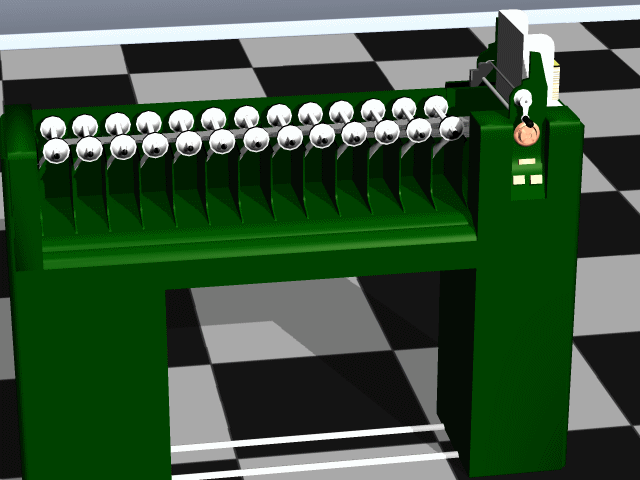 Note that this card with a 4th row punch ends up in the 5th slot. The rightmost slot was for a card with no punches at all**. With no hole to trigger the solenoids, all the chutes would stay up. The rightmost and lowest chute would be above the card, and would kick the card into the 'reject' slot. (In modern software the 'reject' slot is a NULL or None value of the column variable.)
Computers are still mainly sorters with secondary calculating functions. In the last Windows EXE version of my courseware, the C++ source code contains about 13000 non-comment lines, of which only 120 are explicit arithmetic. In other words, only 1% of the action is adding, multiplying, sines, arctans, etc. The other 99% is pattern-matching and counting and recording. Hollerith jobs. The program presents an image or a text question; waits for a click on some part of the image or a button; increments the number answered and number correct; and holds the results in a file.
= = = = =
The business model of IBM's machines was strictly rental. The time pattern of computing business models corresponds to the timeline I observed in media. Start out as individual units, mainly in large markets and academia; spread out to broadly available individual units; re-centralize back to CENTRALLY CONTROLLED systems, turning the world into one unit.
Here's the price list for the 082 and 083 sorters from a 1957 IBM catalog, with inflated modern equivalents in red:
Note that this card with a 4th row punch ends up in the 5th slot. The rightmost slot was for a card with no punches at all**. With no hole to trigger the solenoids, all the chutes would stay up. The rightmost and lowest chute would be above the card, and would kick the card into the 'reject' slot. (In modern software the 'reject' slot is a NULL or None value of the column variable.)
Computers are still mainly sorters with secondary calculating functions. In the last Windows EXE version of my courseware, the C++ source code contains about 13000 non-comment lines, of which only 120 are explicit arithmetic. In other words, only 1% of the action is adding, multiplying, sines, arctans, etc. The other 99% is pattern-matching and counting and recording. Hollerith jobs. The program presents an image or a text question; waits for a click on some part of the image or a button; increments the number answered and number correct; and holds the results in a file.
= = = = =
The business model of IBM's machines was strictly rental. The time pattern of computing business models corresponds to the timeline I observed in media. Start out as individual units, mainly in large markets and academia; spread out to broadly available individual units; re-centralize back to CENTRALLY CONTROLLED systems, turning the world into one unit.
Here's the price list for the 082 and 083 sorters from a 1957 IBM catalog, with inflated modern equivalents in red:
 Note first that these machines were FAST. 650 cards per minute, about 10 per second. A typical stack would take about a minute, with a stream of cards zooming across the top and sliding into their appropriate slots. Those chute blades clicked up and down with remarkable speed and accuracy. The 82 had less electronic components than the old Hollerith; it was mainly a superfast mechanism.
In modern terms a business paid $500 a month for the basic model 82, $1000 a month for the fancier and more automatic model 83. As with cars, options added to the total. The accounting machines, with calculating abilities on top of the sorting, were $1000 a month in 1957 or $9000 today.
Comparing to human workers, a skilled secretary earned about 5 times the rental of the sorter, but a skilled accountant cost the same as the accounting machine.
These machines were usually not connected to any sort of web, but webs did exist in 1957. The telegraph system was still an active data network in 1957, and businesses could also rent private lines from Bell Tel to carry data.
Here's the Data Transceiver, able to read a stack of cards and send their data over any of the 'private webs' to a corresponding transceiver at the other end. The sending speed was about 500 characters per minute, and the price was $200 per month, or $1800 in today's money.
Note first that these machines were FAST. 650 cards per minute, about 10 per second. A typical stack would take about a minute, with a stream of cards zooming across the top and sliding into their appropriate slots. Those chute blades clicked up and down with remarkable speed and accuracy. The 82 had less electronic components than the old Hollerith; it was mainly a superfast mechanism.
In modern terms a business paid $500 a month for the basic model 82, $1000 a month for the fancier and more automatic model 83. As with cars, options added to the total. The accounting machines, with calculating abilities on top of the sorting, were $1000 a month in 1957 or $9000 today.
Comparing to human workers, a skilled secretary earned about 5 times the rental of the sorter, but a skilled accountant cost the same as the accounting machine.
These machines were usually not connected to any sort of web, but webs did exist in 1957. The telegraph system was still an active data network in 1957, and businesses could also rent private lines from Bell Tel to carry data.
Here's the Data Transceiver, able to read a stack of cards and send their data over any of the 'private webs' to a corresponding transceiver at the other end. The sending speed was about 500 characters per minute, and the price was $200 per month, or $1800 in today's money.
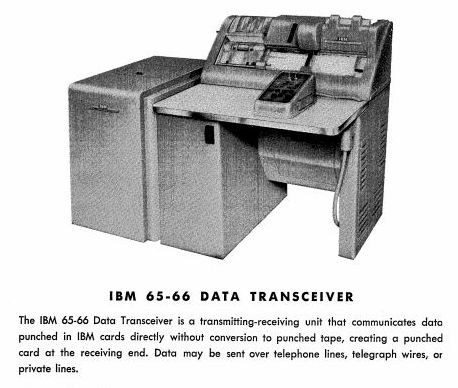 As always, renting is more profitable than selling. IBM and Bell Tel were both rental-based utilities, offering intensive and fast service for a fairly high rental.
= = = = =
** Graphic serendipity sidenote: I wasn't thinking about the reject slot when I animated this action. I just moved the bottom four guides down, then slid the card leftward and followed the first kicker above it. The logic of the mechanism WORKED even though I didn't understand it. Later when rechecking, I noticed the 5 vs 4 inconsistency, thought it was a mistake, then RTFM more closely and understood the 'reject'. As usual, EXPERIMENT LEADS TO THE CORRECT ANSWER regardless of facts and theory.
As always, renting is more profitable than selling. IBM and Bell Tel were both rental-based utilities, offering intensive and fast service for a fairly high rental.
= = = = =
** Graphic serendipity sidenote: I wasn't thinking about the reject slot when I animated this action. I just moved the bottom four guides down, then slid the card leftward and followed the first kicker above it. The logic of the mechanism WORKED even though I didn't understand it. Later when rechecking, I noticed the 5 vs 4 inconsistency, thought it was a mistake, then RTFM more closely and understood the 'reject'. As usual, EXPERIMENT LEADS TO THE CORRECT ANSWER regardless of facts and theory.Labels: Alternate universe, Experiential education, Morsenet of Things
 The story didn't mention Florida, but I think it's safe to include it. Tennessee would also be likely, but not definite.
Except for Arizona, this is a contiguous bloc, capable of mounting a credible threat of secession. The bloc would cut the demonic states in half, presenting a barrier to communication and airspace.
Does Biden think he can win such a war, short of nukes? Many of the missile silos are in Montana and South Dakota.
Most of the soldiers in the volunteer Army are from Dixie. Would they kill their own parents and friends? Unfortunately, yes. Modern soldiers are pure Deepstate robots.
= = = = =
Later thought: Even if they don't threaten secession, I wish the governors would get their act together, literally. From the fucking start of this holocaust, a well-organized NEARLY TOTAL mass disobedience WITH PERSISTENCE would have halted the demons. A small number of disobeyers can simply be arrested and jailed. Protesters in the streets WILL be jailed. But when 90% of businesses refuse to cooperate and CONTINUE TO REFUSE, the demons run into limits of police and economic resources.
Unions knew how to do it. Unions organized ALL the workers in one industry and moved them IN UNISON, with a massive strike fund to support the workers while their wages were gone. Corporations knew that the unions couldn't be broken, so they yielded to demands instead of enduring a strike.
United action and stored resources are the key. The demonic Mecher gang planned and prepared in secret, and switched on the holocaust IN UNISON ACROSS THE WHOLE FUCKING GLOBE in March 2020. Businesses and individuals had no chance to prepare and organize against the most massive crime in history. Unions were inside the crime gang, working FOR genocide, not against.
Now the sane states have been out of the holocaust for a full fucking year, so they could have been preparing a unison strike. Unfortunately they don't seem to be acting together or trying to use massive economic force. Each is filing an individual lawsuit, which will get lost in the demonic "court" system.
The story didn't mention Florida, but I think it's safe to include it. Tennessee would also be likely, but not definite.
Except for Arizona, this is a contiguous bloc, capable of mounting a credible threat of secession. The bloc would cut the demonic states in half, presenting a barrier to communication and airspace.
Does Biden think he can win such a war, short of nukes? Many of the missile silos are in Montana and South Dakota.
Most of the soldiers in the volunteer Army are from Dixie. Would they kill their own parents and friends? Unfortunately, yes. Modern soldiers are pure Deepstate robots.
= = = = =
Later thought: Even if they don't threaten secession, I wish the governors would get their act together, literally. From the fucking start of this holocaust, a well-organized NEARLY TOTAL mass disobedience WITH PERSISTENCE would have halted the demons. A small number of disobeyers can simply be arrested and jailed. Protesters in the streets WILL be jailed. But when 90% of businesses refuse to cooperate and CONTINUE TO REFUSE, the demons run into limits of police and economic resources.
Unions knew how to do it. Unions organized ALL the workers in one industry and moved them IN UNISON, with a massive strike fund to support the workers while their wages were gone. Corporations knew that the unions couldn't be broken, so they yielded to demands instead of enduring a strike.
United action and stored resources are the key. The demonic Mecher gang planned and prepared in secret, and switched on the holocaust IN UNISON ACROSS THE WHOLE FUCKING GLOBE in March 2020. Businesses and individuals had no chance to prepare and organize against the most massive crime in history. Unions were inside the crime gang, working FOR genocide, not against.
Now the sane states have been out of the holocaust for a full fucking year, so they could have been preparing a unison strike. Unfortunately they don't seem to be acting together or trying to use massive economic force. Each is filing an individual lawsuit, which will get lost in the demonic "court" system.Labels: #WholeOfSociety, endless hell, Jackboot stomping forever
“The law authorizes only private citizens to bring civil suit in Texas state court against those who perform, aid and abet abortions after a fetal heartbeat is detected,” Snead said. “Women seeking abortions are immune from suit, and there is an exception for medical emergencies. “The Texas strategy was ingenious in that it evaded the usual pre-enforcement injunction by a federal court, which only has the constitutional power to act when the parties before them are involved in a real dispute,” Snead continued. “Because neither the state officials nor the private citizen sued in the case were involved in the enforcement of the law, the Supreme Court lacked the power to intervene.”Needless to say, the Feds are starting a #WHOLE-OF-GOVERNMENT response.
Biden said he has directed a “gender-focused policy council” in the White House, the Office of the White House Counsel and the Health and Human Services and the Justice Departments to “launch a whole-of-government effort” to respond to the court’s decision. The effort will look “specifically to the Department of Health and Human Services and the Department of Justice to see what steps the Federal Government can take to ensure that women in Texas have access to safe and legal abortions as protected by Roe,” he said in a statement.They will also try using the FACE Act, designed to punish protesters at abortuaries. The FACE Act hasn't been used much, and clearly wasn't meant to deal with lawsuits, so this seems less productive.... but I'm sure the Feds will get around that. They have now defined lawsuits as bioterrorist attacks. = = = = = The biggest question in my mind is how the Texas legislature acquired the GUTS to do something smart and meaningful. Repooflican legislators elsewhere, even when they have clear majorities, have never even TRIED to solve a problem. They just obey Deepstate. Purely guessing: Texas is allegedly turning blue in terms of presidential votes, and all the cities in Texas voted D in 2020. But those Ds are different from the Ds in Illinois or Washington. Many of them are Hispanic. So the usual rigid demarcation on abortion doesn't apply. Many of the People Who Count are pro-life. Meta-thought: Normally the Supremes ABORT every anti-abortion law before it's born. The Texans prevented the ABORTION of their pro-life law, and allowed it to be born normally.
Labels: #WholeOfSociety
